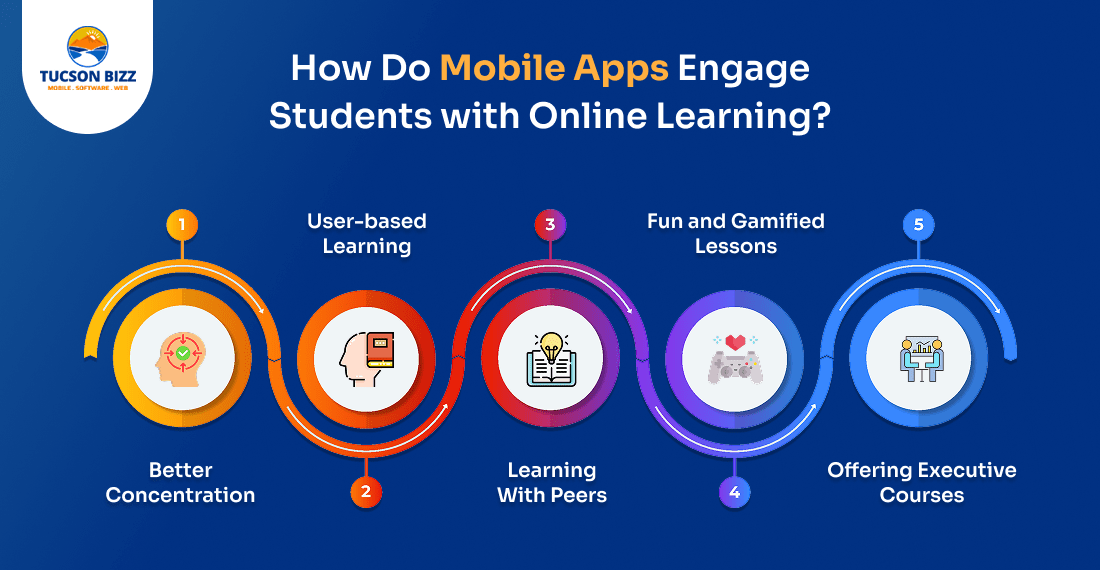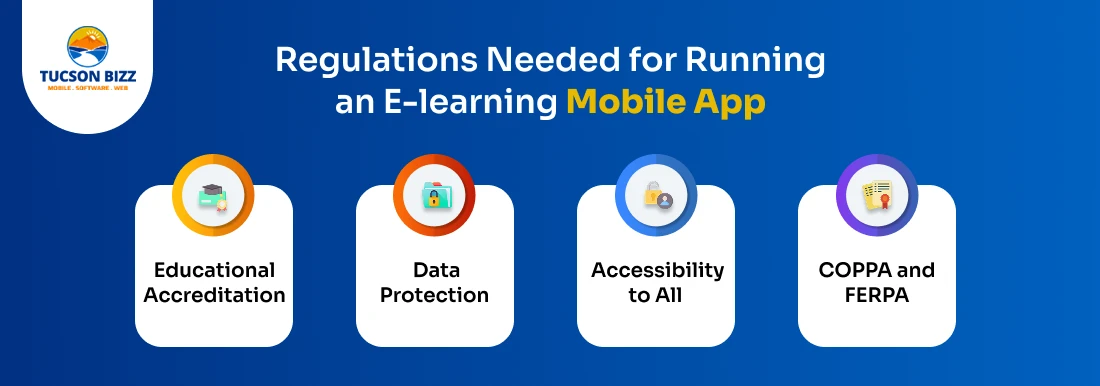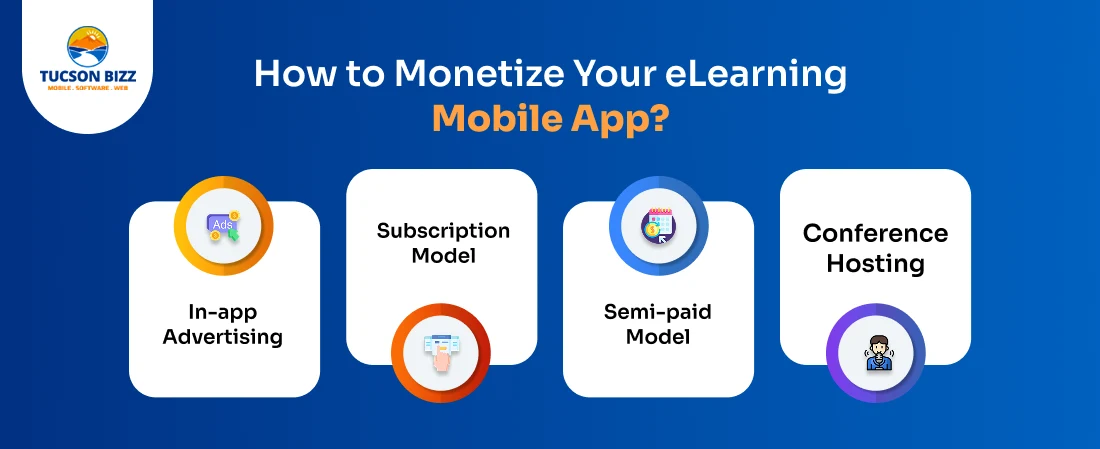September 18, 2025
By: TucsonBizz Staff Writer
TucsonBizz is a division of Sofvue, LLC.
Printed with permission of Data Titan, Sofvue LLC
Mobile applications have significantly influenced the education sector by making learning more accessible, engaging, and tailored to individual student needs. While digital learning tools were gaining traction prior to 2020, the onset of the COVID-19 pandemic served as a catalyst, accelerating widespread adoption. As lockdowns forced schools, universities, and training institutions to transition online, the eLearning model rapidly expanded, reshaping how education is delivered and consumed.
This shift has been accompanied by tremendous market growth. Projections indicate that revenue in the global online education sector will reach $99.84 billion by 2025. Whether a learner seeks to acquire a new language or pursue an accredited academic degree, digital platforms now offer a flexible and effective pathway to achieve those goals. Beyond practicality, today’s online learning environments are increasingly designed to be interactive and enjoyable—incorporating gamification, multimedia content, and social features to enrich the user experience.
For Phoenix-based educational institutions and service providers, investing in a robust mobile application can significantly enhance student engagement and satisfaction. Are you looking to position your institution as a leader in Tucson’s competitive education market? This blog explores how educational mobile apps can improve student retention, deepen learning outcomes, and ultimately drive institutional growth. We’ll also examine the specific features that contribute to increased credibility and revenue for your online learning platform.
Brief Overview of Educational Apps and Their Usage
Commonly referred to as eLearning mobile applications, these technology-driven platforms enable students to access educational content directly through their smartphones. Designed to align with individual learning preferences, these apps allow users to attend virtual lectures, submit coursework, and earn digital certifications—all within a single, integrated environment. This approach not only modernizes the educational process but also extends access to a broader and more diverse student population.
Educational mobile apps are equipped with a range of dynamic features that simplify and enrich the learning experience. For instance, students can participate in live or recorded lectures from virtually any location—across the country or around the globe, fostering both flexibility and continuity in education.
How Do Mobile Apps Engage Students with Online Learning?
Education apps generated $5.93 billion of revenue in 2023, with increased growth and user penetration rate during the pandemic. Schools, colleges, tuition centers, and other institutions are now hiring expert mobile app development agencies to build functional and student-centric eLearning applications.

#1. Better Concentration
Mobile applications designed to facilitate online learning offer the huge benefit of remote education. Learners can view lectures and lessons whenever they want. There is no specific time for classes, all the recorded sessions are available on the app 24/7. Having the autonomy to study in their own time, learners tend to concentrate more.
They can juggle between multiple courses, jobs, and other chores, and still manage to complete their lectures. Allowing your learners to choose their ‘time of studying’ helps them to engage better with the app. They do not feel ‘compelled’ or ‘forced’ to study when they do not want to. Life happens, sometimes you have a medical or family emergency. Online learning with virtual classes comes in handy in such situations when attending a lecture by being physically present in a school or college is difficult.
#2. User-based Learning
Personalized learning in eLearning apps really ramps up user engagement by customizing content to fit each person's unique needs, preferences, and pace. Unlike the typical one-size-fits-all methods, personalized learning adjusts according to a learner’s strengths, weaknesses, and performance data. This approach makes users feel recognized and supported, turning learning into a more relevant and enjoyable experience. Features like progress tracking, adaptive quizzes, and user-specific course recommendations keep learners motivated and invested in their learning journey.
Plus, learners tend to remember information better when it is presented in a way that resonates with them, be it through videos, gamified lessons, or real-world scenarios. By providing flexibility and a sense of autonomy, personalized eLearning nurtures ownership and control, which naturally enhances engagement. It also cuts down on frustration and boredom by removing unnecessary repetition and circling back on areas that genuinely need improvement. In the end, personalized learning transforms digital education into a more dynamic, effective, and user-centered experience.
#3. Learning With Peers
Collaborative learning is one of the effective methods of boosting your online education app’s engagement. Users can connect their social media handles to the app, which makes learning more fun. They can share their achievements, badges, and certificates online with their loved ones. The app also encourages them to adopt the collaborative learning approach, where learners can study with their friends.
For example, this model works best for language courses. They can have practice sessions with friends and peers to polish their language speaking through video and audio calls via mobile apps. Schools can introduce a points-based extra curriculum for such courses to help them learn better.
#4. Fun and Gamified Lessons
Learning should be fun and engaging, no matter how old you are. It often takes a bit of mental effort and motivation to really soak up new information, which is why making the learning process enjoyable is so important. With all the technology at our fingertips today, educational institutions, especially schools, can really step up their game by adding gamified lessons to their online platforms.
These interactive, game-like features grab students’ attention, encourage participation, and simplify complex topics. Gamification promotes active engagement and provides instant feedback, transforming lessons into exciting challenges instead of boring tasks. You can make education more immersive and enjoyable as gamified learning not only sparks student interest but also boosts retention and performance, paving the way for more effective and modern learning experiences.
#5. Offering Executive Courses
The US executive education program market size is projected to reach $15.7 billion by 2033. People already working on a job prefer to improve because of the growing competition. Offering several executive courses boosts your educational institution’s reach. As we already know, learning has no age bar! Executive programs provide a golden chance for people who had to quit their studies to feed their families or those who now feel settled in life and would like to grow in their careers.
Also Read: Mobile App Development: Expectations Vs. Reality
Regulations Needed for Running an E-learning Mobile App
The online education market in the US is vast but your institution needs to comply with certain regulatory standards to avoid penalties. The eLearning mobile app should adhere to ensuring data and confidential information security, legal compliance, overall user safety, and the educational platform’s legitimacy. If you are operating in Tucson, here is a checklist to consider:

1. Educational Accreditation
One of the basic requirements is that your school or college should have proper accreditation to successfully offer full-fledged courses like degrees, diplomas, and other related certifications. Accreditation is key to ensuring that your institution meets the established standards of quality and credibility, which in turn makes your courses more valuable and recognized by a wider audience. In the US, this usually means getting approval from a regional or national accrediting body that is acknowledged by the US Department of Education or the Council for Higher Education Accreditation or CHEA. If your institution is not accredited, students might not find your mobile app trustworthy.
2. Data Protection
Data security is one of the biggest concerns of online learners. Users, especially the young ones, are often troubled by thoughts like: Will they leak my personal information? Or What if my scores are made public? As a trusted education online provider, your mobile app should be layered with multiple protection systems to safeguard essential user data.
3. Accessibility to All
Thanks to the internet, taking online courses is easier today than at any prior time in history. However, the accessibility of online mobile apps to people with certain disabilities can be a challenge. On that note, accessibility is a vital part of any eLearning platform. As a Tucson-based school providing online education, your app should adhere to the Americans with Disabilities Act (ADA) and the Web Content Accessibility Guidelines (WCAG). This helps you make sure that learners with visual, auditory, cognitive, or motor disabilities can engage with content without any problem. This means incorporating features like screen reader compatibility, video captions, and keyboard navigation. Creating an inclusive platform not only helps meet legal guidelines, but provides a more robust environment for learners engagement on the app.
4. COPPA and FERPA
It is mandated by US law that an educational institution cannot share student information with other apps or websites without the parent or guardian’s consent. This protocol falls under the Family Educational Rights and Privacy Act, also called FERPA. Another regulation you should be mindful of is COPPA, which is the Children’s Online Privacy Protection Act. It restricts companies from collecting information about kids under the age of 13.
How To Monetize Your eLearning Mobile App?
A report by IMARC Group expects the global eLearning market to reach 68.3 Billion by 2033. Your education institution in Tucson can also produce a new revenue stream with an eLearning mobile app. Here is how:

✔️ In-app Advertising
Schools can run paid advertisements on their eLearning apps. This can significantly contribute to their revenue as many tutors, certification centers, and other businesses would be more than happy to list their ads on your mobile app. However, since the app is a learning platform, you should ensure the ads posted on it are not offensive. The best course of action would be to advertise products and services closely aligning with the education sector.
✔️ Subscription Model
If you are seeking a higher revenue stream, then providing subscription-based education is the ideal way. The learners can pay separately for courses and degrees, or you can add a monthly or annual subscription system. This will allow them to access all the features of your eLearning mobile app without any hindrance.
✔️ Semi-paid Model
Much like the subscription structure, a semi-paid model offers some features of the app for free while the premium ones will be paid. This keeps the learners engaged with the unpaid lessons and courses while also generating revenue from the paid features.
✔️ Conference Hosting
Influencers, educators, and other professionals can conduct meaningful workshops online. Interested learners can enroll in these workshops by purchasing an access pass to view the content, either in a live environment, or offline at a convenient time that fits their schedule.
You may also like to read: E-commerce Mobile App Development Cost & Features
Choose TucsonBizz for an Engaging eLearning Mobile app
The global landscape has entered a transformative phase where digital technologies and software solutions are reshaping key industries, education being one of the most impacted. For schools and academic institutions in Tucson seeking a comprehensive digital transition, a custom mobile application offers the most effective and scalable solution.
TucsonBizz is committed to guiding your institution through this digital evolution. As a leading and highly regarded mobile app development firm, we provide a proven track record of delivering successful, high-impact projects. Our approach centers on quality, innovation, and a deep commitment to aligning our solutions with the unique goals and expectations of each client.
Do you have an impactful eLearning project in mind? Feel free to contact us by sending an email to [email protected] or giving us a call at 623-845-2747. You can also visit our website for more information.
RE: 11922
Citations:
Statista: https://www.statista.com/outlook/emo/online-education/united-states
Future Market Insights: https://www.futuremarketinsights.com/reports/united-states-executive-education-program-market
IMARC: https://www.imarcgroup.com/e-learning-market
Business of apps: https://www.businessofapps.com/data/education-app-market/





